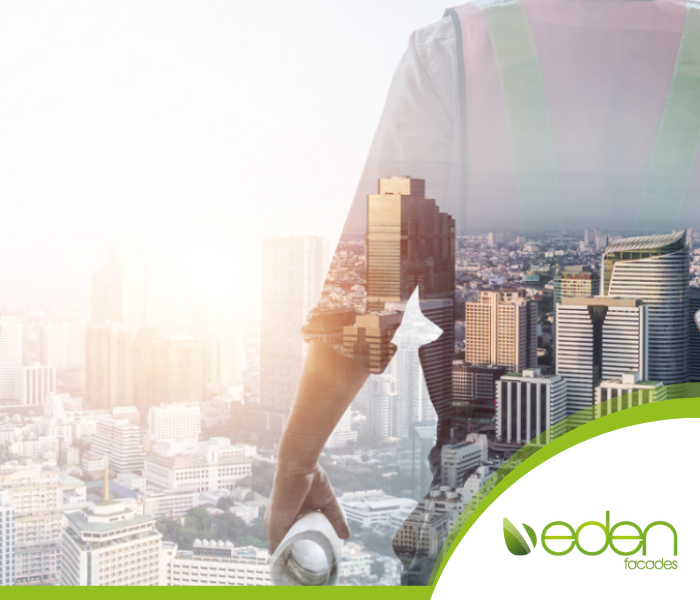Facades are changing fast, with options such as fibre cement and aluminium panels growing in popularity. Drivers of change include an increasing focus on sustainability, fire safety and on quick, offsite construction methods. Technological change is making previously non-competitive options into strong challengers and adding aesthetic options.
Eden Facades was founded in 2011, and the 13 years since then have seen many changes in our sector. Here, we take a look at what they are and how they’re influencing the landscape of facades.
Sustainability as a priority
The climate emergency is a huge cause of change, with strong regulatory requirements as well as personal and corporate commitment meaning this issue increasingly takes centre-stage when façades are specified.
One development that is increasingly seen, regardless of materials involved, is thicker walls and other surfaces, with more insulation present. The Building Regulations now create strict requirements for the thermal characteristics and energy efficiency of buildings. The regulations don’t directly dictate wall thickness. Rather, they set requirements for U-values. These measure the thermal efficiency of walls and other 2D surfaces, with lower numbers being better. For new build projects, walls must achieve values of 0.16 (domestic) or 0.22, (non-domestic). The 0.16 requirement, for example, can often require 250mm of insulation.
Aluminium is a material that is growing very quickly in take up for our clients’ projects. This fast growth is one of the biggest changes affecting façade design. Aluminium panels reflect sunlight and are easy to fill with good insulation, meaning they are very self-regulating in temperature, both on hot and cold days, cutting bills for heating and cooling and aligning well with regulatory obligations.
Another sustainability advantage of this material – and other metals – is that they are infinitely recyclable without loss of quality. The panels are light, making them easy to manufacture and transport, and quick to install. The first major project to use aluminium was the Washington Monument in the US capital, in 1884, the metal then being more expensive than gold. Until much more recently than that, aluminium has been a pricey option, but technological advances such as extrusion production have made aluminium panels an affordable option.
Façades that are beautiful and functional
Natural materials, such as stone, wood, and brick, have always been popular for their aesthetic appeal. Glass is also a great option as it is lightweight and transparent, allowing for natural light to come through.
However, newer materials are starting to challenge these traditional options in terms of visual possibilities. For instance, modern fibre cement can be customised into a wide range of colours and patterns. This material is also highly durable and price-competitive and can last up to 100 years with proper maintenance. One disadvantage of fibre cement is that it is not as lightweight or easy to install as aluminium, for example.
Nonetheless, its advantages mean it is growing in popularity at a similar rate to aluminium. This phenomenon is again recent, with the modern non-asbestos formulations dating only to the mid-80s. Newly successful materials are often still in the phase of playing catch-up with more traditional choices, but the catch-up is happening quickly.
Fire safety in the post-Grenfell era
External wall elements, including everything from façades to plasterboard, must now achieve Euroclass A1 (non-combustible) or A2 (limited combustibility), though there are some exemptions.
Aluminium panels are easier to make fire resistant than some traditional options such as timber – especially untreated timber – and PVC. Fibre cement is also relatively easy to manufacture in adherence to modern fire safety requirements.
“Fire safety and sustainability regulations are causing the construction sector to substantially rethink its approach to façade design,” comments Terry Box, SHEQ Manager at Eden Facades. “New technology means options that were not practical recently are now very popular. For a specialist like us, that means keeping abreast of fast change and new opportunity. From the outset, our company has embraced modern methods of construction and innovation, so we are well-placed to ride the wave of change that is sweeping away old assumptions in the industry.
Whatever the requirements – we’re here to help!
Eden Facades offers services in rainscreen cladding (installation and remediation), rendering, lightweight structural framing, plus installation of windows and curtain walls. Whatever your needs, and whatever the latest technologies and regulations, we will be there to support our clients, ensuring they get the right solutions to their commercial, technological and sustainability goals.
To speak to an expert about the right choice for your next project, please call our team on 01268 744 199 or email office@edenfacades.co.uk.

